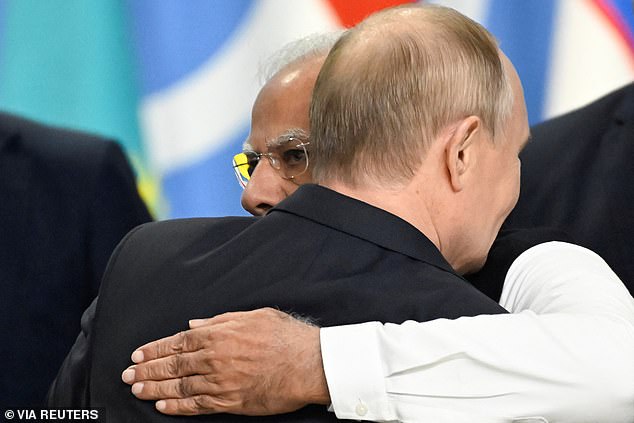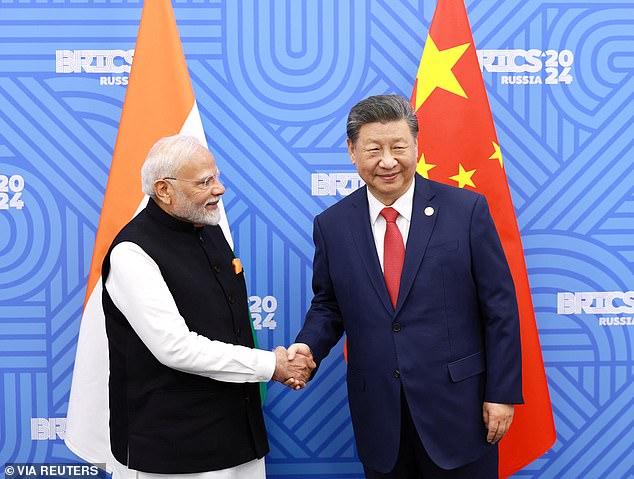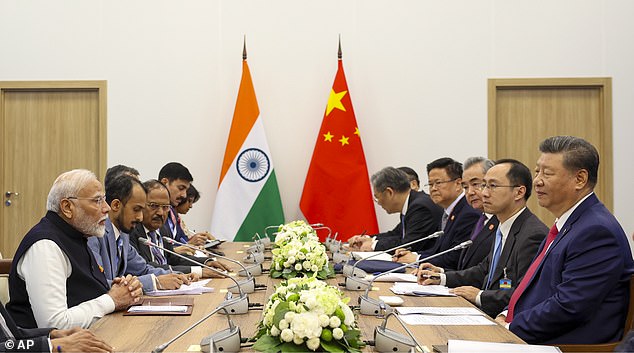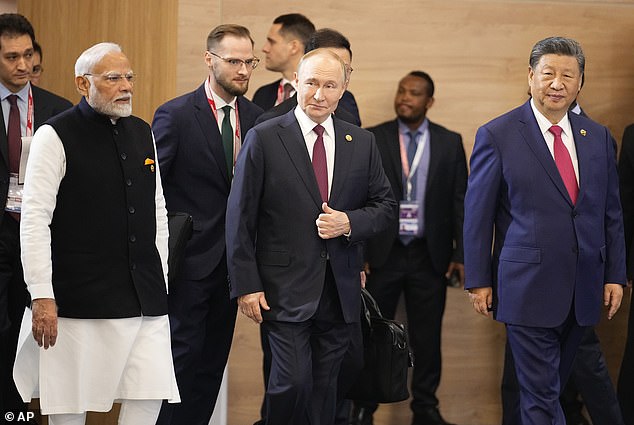A sort of smile could be discerned on Vladimir Putin’s peculiarly tense features as he welcomed President Xi Jinping of China and Prime Minister Narendra Modi of India to a conference in the Russian city of Kazan last week.
This was the so-called Brics summit and, as the Russian leader currently holds the rotating presidency, it was always going to be held there.
However, the idea that is being spread that this was a triumph for the assassin in the Kremlin is belied by what really happened in Kazan. Putin’s position did not draw statements of support from the leaders of the world’s two most populous nations.
In particular, the revelation that Russia had gotten North Korea to provide 1,500 troops for its war in Ukraine was poorly received.
Xi Jinping declared that there should be “no expansion of battlefields or escalation of hostilities”, while Modi warned that the meeting should not be seen as a united front against the West: “We support diplomacy, not war.”
Vladimir Putin hosted Chinese President Xi Jinping and Indian Prime Minister Narendra Modi at a conference in the Russian city of Kazan last week.

President Modi hugs Putin at the end of the conference. Modi warned that the meeting should not be seen as a united front against the West
The war against Ukraine is said to be going well for Putin at the moment, at least in terms of territory gains. But the Russians have made no progress.
And as our wise former ambassador to Moscow, Sir Roderic Lyne, told me: “In the last two months, the Russians have seized some 300 square miles – equivalent to less than a fifth of Essex – at an estimated cost of 60,000 victims. , dead and wounded, that is, about 200 per square mile in a country of more than 230,000 square miles. No wonder they need the North Koreans.
In other words, Putin simply cannot find enough Russians to continue waging his catastrophically stupid (and criminal) war against a people who claim to be “brothers.”
A further demonstration of this situation is the Kremlin’s decision, implemented this month, to give freedom not only to prisoners, but to all those facing trial, in exchange for going to the front.
As one Russian lawyer describes it: ‘Now the police can catch a man over the dead body of someone he has just killed. They tighten the handcuffs and then the killer says, ‘Oh, wait, I want to go on a special military operation,’ and they close the criminal case.’
This will lead to a further collapse of the Russian criminal justice system, and it is worth remembering that it was to address a similar disintegration under Boris Yeltsin that Putin had (successfully) risked his reputation when he took office in 1999. Now, even The Official figures show that organized crime has skyrocketed and shooting in the streets has once again become almost commonplace in Moscow.
But the main reason for Putin’s popularity was based on his stabilization of the economy. Admittedly, this had more to do with the coincidental rise in global oil prices shortly after he succeeded Yeltsin: since hydrocarbons are overwhelmingly the largest source of Russian income, they are what keep the public’s pensions paid.

At the conference, Xi Jinping declared that there should be “no expansion of battlefields or escalation of hostilities.”

Inside the so-called Brics summit where Russian leader Putin currently holds the rotating presidency
However, since Putin launched his full-scale invasion of Ukraine, his revenue from this crucial resource has been cut in half. Western sanctions may have proven porous, but China and India have been relentless in negotiating prices for the oil they buy from Russia – and Beijing has shown no interest, despite Putin’s pleas, in an agreement on a Sino-Russian gas pipeline to replace the currently closed connection between Moscow and Western Europe.
Meanwhile, Putin has turned the domestic economy into something akin to the “structural militarization” that ultimately led the Soviet Union to penury and partition.
The intensity of the push towards arms production has deprived other sectors and, indeed, employees of investment. This affects the product that worries all Russians the most: food.
As a Global Intelligence Services briefing paper notes: ‘Between January and July of this year, tractor and planter production fell more than 22 percent. In mid-August, suppliers of key food products informed retailers of pending price increases of up to 40 percent.
Officially, the headline inflation rate is around 9 percent. But can you believe that? An indicator of the true situation was last Friday’s announcement by the Russian Central Bank that it would increase its base interest rate by 2 points to a staggering 21 percent.
This is a blow to the country’s housing market, especially since, in July, the government abandoned its homeowner subsidy plan that had kept mortgage rates at 8 percent.
But it is not only the real estate market that will now be affected by very high interest rates, partly a consequence of Russia’s inability to borrow on international markets (the Chinese will not even lend to them in renminbi, Beijing’s exchange rate ). official currency).
Last week, Sergei Chemezov, CEO of Russia’s largest state-owned industrial holding company, Rostec, said of the latest interest rate hike: “If we continue working like this, most of our companies will go bankrupt.”
Regarding the increase to more than 20 percent in borrowing costs, Chemezov observed: ‘There is no 20 percent profitability anywhere. Maybe in drug trafficking, but not even the sale of weapons generates such profits.’
As it happens, Russia’s once-thriving arms export trade has also collapsed, for the simple reason that it now needs all of them, and more, for its own use.
As Swedish economist Anders Aslund noted: “To its shame, the Kremlin has been forced to import artillery shells from its even more backward neighbor, North Korea.”
Does all this mean that even the stoic Russian people will begin to turn against Putin? The penalties for doing so are so brutal that they may seem improbable. But if the continued disintegration of the country’s infrastructure leads to widespread loss of home heating in winter, that could be a trigger.
Last winter, there was public discontent when almost 600 “serious incidents” affected critical infrastructure and 3 million Russians were left without heat.
Since the Kremlin had claimed that Europeans would die of hypothermia without Russian gas, this led residents to ask: “Why is it not Europe, but us, who are dying of cold?”
Putin has obviously been focusing on destroying Ukraine’s energy grids, but if his own people are suffering from rising costs, food shortages, and even blackouts, they will hardly see that as any consolation.
In this context, it is perverse for some Western politicians to conclude that the sanctions campaign against Moscow and its military aid to Ukraine has been a failure. And it is even more perverse to fall for the idea, propagated by the Kremlin, that there is an inevitable tide toward Russian “victory” (whatever that means).
Look again at those photographs of Putin with the leaders of India and China at that summit in Kazan.
Is it really a genuine smile on the face of the Russian president? Or is it a grimace disguised as a smile?

